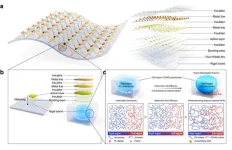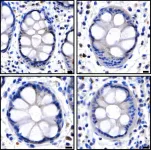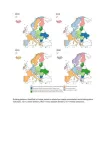Plant-sourced nitrate proves positive to human health
2024-06-25
(Press-News.org)
Plant-sourced nitrate proves positive to human health
New research from Edith Cowan University (ECU) has found that nitrate from plant sources is associated with a lower risk of mortality while nitrate from other sources such as animal-based foods, processed meat and tap water, is linked to a higher risk of mortality.
Nitrate, a compound found in vegetables, meat, and drinking water, has been the subject of debate due to its potential impact on health. Emerging evidence suggests that dietary nitrate may play a role in preventing cardiovascular disease (CVD), dementia, and diabetes. However, concerns about a potential link between nitrate ingestion and cancer have led to uncertainties surrounding the consumption of high-nitrate leafy green vegetables.
ECU’s Dr Nicola Bondonno led the project which has found that among 52,247 participants of the Danish Diet Cancer and Health Study, moderate to high intakes of plant and vegetable sourced nitrate were associated with a 14% to 24% lower risk of all-cause, CVD-related, and cancer-related mortality.
While the research could not attribute plant-based nitrate as the sole contributor to human health, given that plants and vegetables contained a range of other protective compounds which themselves were associated with a lower risk of CVD, cancer and mortality, the research underscored the value of higher intakes of nitrate-rich vegetables to mitigate mortality risks.
The research also added to the growing evidence that there was no cause for concern regarding cancer risks from the consumption of nitrate-rich vegetables such as leafy green vegetables and beetroot.
Conversely, higher intakes of naturally occurring animal-sourced nitrate were associated with a 9% and 12% higher risk of all-cause, and CVD-related mortality, respectively. Higher intakes of naturally occurring animal-sourced nitrite, a compound formed from nitrate, were associated with a 25%, 29% and 18% higher risk of all-cause, CVD-related, and cancer-related mortality, respectively.
Meanwhile, higher intakes of nitrate and nitrite from processed meat sources were associated with a 12% to 22% higher risk of all-cause and cancer-related mortality while only additive permitted meat-sourced nitrite was positively associated with CVD-related mortality.
Participants with a higher intake of tap water-sourced nitrate had a higher risk of all-cause and CVD-related mortality but not cancer-related mortality.
Dr Bondonno, who is currently based at the Danish Cancer Institute, said that the source of the nitrate determined the body’s reaction to the nitrate.
“In simplistic terms, nitrate can go down two different pathways when introduced into the body. One is to form a compound called nitric oxide, which has been shown to improve blood flow, lower blood pressure, and support overall cardiovascular health.
“But nitrate may also go down a second pathway, forming a group of compounds called nitrosomines, which are considered to be carcinogenic and are linked to cancer. It is thought that the antioxidant compounds in vegetables push nitrate towards the first pathway.”
The advice resulting from the most recent research fits in with what is commonly known about the optimal human diet; eat more plants and less animal products and limit the amount of processed meats.
“The majority of fears around nitrate consumption have generally stemmed from concerns around cancer, but one of the most interesting findings from this research is that nitrate found in drinking water was more strongly linked to deaths from heart disease.
“Nitrate sourced from plants and vegetables are protective against the different kinds of mortality. But when nitrate comes from animal sources or tap water, it increases your risks, mainly of heart disease, but also of certain cancers.”
- ends -
Media contact: Esmarie Iannucci, 08 6304 3080 or 0405 774 465
Mail to: e.iannucci@ecu.edu.au
Journalists can subscribe to get the latest research news delivered to your inbox.
END
ELSE PRESS RELEASES FROM THIS DATE:
2024-06-25
□ Professor Kyung-In Jang’s research team from the Department of Robotics and Mechatronics Engineering at DGIST (President Kunwoo Lee) has succeeded in developing a highly stable stretchable electronic device, which overcomes the mechanical limitations of conventional inorganic materials and enhances their stretchability and durability. In collaboration with Professor Taeho Park’s team from the Department of Chemical Engineering at POSTECH (President Seong-Keun Kim), the research team has developed a stretchable hybrid polymer and applied it to electronic devices, enabling them to operate stably even under deformation ...
2024-06-25
Fully automated diagnostic techniques, including liquid handling robots, are poised to improve the lives of millions of people living with inflammatory diseases worldwide.
A landmark WEHI study has revealed new methods in detecting necroptosis, a key factor in many inflammatory diseases like psoriasis, arthritis and inflammatory bowel disease.
The findings mark a huge leap forward in our ability to diagnose necroptosis accurately. They also offer practical methods that can be easily reproduced in hospitals worldwide, giving hope for new ways to treat inflammatory diseases.
At a glance
Necroptosis is a form of cell death, one of the body’s natural ...
2024-06-25
Embargoed for release: Monday, June 24, 7:30 PM ET
Key points:
In a study of loneliness and stroke risk over time among adults ages 50+, those who experienced chronic loneliness had a 56% higher risk of stroke than those who consistently reported not being lonely.
Those who experienced situational loneliness did not have an elevated risk of stroke—suggesting that the impact of loneliness on stroke risk occurs over the longer term.
Boston, MA—Chronic loneliness may significantly raise older adults’ risk of stroke, according to a new study led by Harvard T.H. Chan School of Public Health.
“Loneliness is increasingly considered a ...
2024-06-25
The risk of developing Parkinson’s is at least twice as high in people with anxiety compared to those without, finds a new study by UCL researchers.
The research, published in the British Journal of General Practice, investigated whether there was a link between people over the age of 50 who had recently developed anxiety and a later diagnosis of Parkinson’s.
The team used UK primary care data between 2008 and 2018 and assessed 109,435 patients who had developed anxiety after the age of 50 and compared them to 878,256 matched ...
2024-06-25
A new study of drinking patterns across Europe from 2000 to 2019 shows that drinking occurs in stable, beverage-specific clusters that seem to be partly determined by geography. The study was published today by the scientific journal Addiction.
The study identified six drinking patterns in Europe in 2019:
Wine-drinking countries: France, Greece, Italy, Portugal, and Sweden. Characterized by the highest consumption of wine, lowest consumption of beer and spirits, and lowest overall alcohol consumption.
High beer/low spirit drinking ...
2024-06-25
Scientists at the University of Copenhagen discover a link between birthweight and the risk of health complications from obesity during childhood. The findings highlight the need for prevention and treatment approaches for children with obesity who were born with a lower birth weight.
Hundreds of millions of people live with obesity, which is normally measured as a higher-than-optimal body mass index (BMI). While an elevated BMI increases the risk of a range of cardiometabolic diseases and is responsible for around five million deaths a year according to the World Health Organization, not everyone is equally at risk.
Scientists at the ...
2024-06-25
Vienna, Austria: Cannabidiol (CBD), one of the active ingredients in cannabis, is thought to be safe as it does not cause a “high”. Increasing numbers of pregnant women take CBD, believing that it can help alleviate symptoms such as morning sickness, insomnia, anxiety and pain.
However, research presented today (Tuesday) at the Federation of European Neuroscience Societies (FENS) Forum 2024 [1,2], suggests that it may affect offspring. Two studies in mice have shown that gestational exposure to CBD alters the behaviour of offspring and also affects the nerve cells (neurons) in the insular cortex (IC) ...
2024-06-25
A fingerprint may soon be all a doctor needs to check whether tuberculosis patients are taking their antibiotics – thanks to a new study led by the University of Surrey.
Scientists successfully detected the drugs in finger sweat – and with almost the same accuracy as a blood test.
Professor Melanie Bailey, an analytical chemist and co-author of the study from the University of Surrey, said:
“Up until now, blood tests have been the gold standard for detecting drugs in somebody’s ...
2024-06-25
By Leah Shaffer
Using animals to study heart disease doesn’t always translate well to human health outcomes, and human heart cells available for research don’t work outside the human body.
“You can’t keep them alive, much less function outside of the person for long enough to study these processes,” said Nathaniel Huebsch, an assistant professor of biomedical engineering in the McKelvey School of Engineering at Washington University in St. Louis. Huebsch is studying cells with a mutation that causes hypertrophic cardiomyopathy (HCM), a disease that can set off heart failure ...
2024-06-24
Intervention improved well-being in workers who were highly stressed by the job
Health care worker burnout was on the rise before COVID-19 and continues today
Addressing significant structural barriers in U.S. health care ‘needs to be a top priority’
Easily accessible individualized solutions also are needed to boost well-being in stressed health-care workers
CHICAGO --- The COVID-19 pandemic exacerbated already rising rates of burnout among American health care workers. A new Northwestern University study found learning and practicing skills that increase positive emotion like gratitude, mindful awareness and self-compassion ...
LAST 30 PRESS RELEASES:
[Press-News.org] Plant-sourced nitrate proves positive to human health



